Early intervention for autism can be a game changer in a child's growth! It significantly enhances communication, reduces those challenging behaviors, and fosters a sense of independence. When parents get timely support through personalized programs—like ABA therapy—there are substantial improvements in various skills. This leads to better long-term outcomes and an overall improved quality of life for children with autism.
Let’s explore this together! Timely intervention not only helps with immediate challenges but also sets the stage for a brighter future. Imagine seeing your child thrive, communicate better, and navigate the world with more confidence. These personalized programs can truly make a difference!
We’re here to help you every step of the way! If you’re considering support options, remember that you’re not alone on this journey. Reaching out for help can open doors to wonderful resources that can empower both you and your child. Together, we can create a path towards success and happiness!
Supporting a child with autism can truly be a rewarding yet challenging journey. Early intervention is key to shaping their developmental path. By using tailored strategies, families can unlock amazing benefits that boost communication, social skills, and independence in their children.
But how can parents effectively navigate this crucial phase to ensure their child gets the best support possible? Let’s explore the profound advantages of early intervention together! Not only can it lead to immediate improvements, but it also has a lasting impact on a child's future.
At Rori Behavioral Innovations Inc., we believe in the power of Applied Behavior Analysis (ABA) therapy as a key part of our early intervention autism benefits strategies. Our approach is all about you and your child! Each individual’s unique needs are carefully assessed through thorough evaluations, leading to a personalized treatment plan that focuses on enhancing communication, social skills, and independence. 🌟
These tailored programs often include strategies to help young individuals use their newfound skills in different environments, promoting self-sufficiency. Plus, with the integration of AI-driven technologies, Rori Care ensures that our methods are not only effective but also adaptable to your child's evolving needs, providing the best possible support from the start.
Research shows that early intervention autism benefits include timely, personalized assistance that can lead to significant improvements in cognitive, communication, and social skills, paving the way for greater independence and better long-term outcomes for children with autism. And let’s not forget—educating caregivers is crucial! By empowering families, we can enhance the effectiveness of ABA therapy, enabling you to support your child’s growth at home. We’re here to help you every step of the way! 😊
One of the most notable early intervention autism benefits is the improvement in communication abilities for individuals with autism. These individuals often face challenges in both spoken and unspoken communication. Programs that use Applied Behavior Analysis (ABA) techniques are particularly effective because they focus on structured activities and social interactions that help foster these essential skills.
Studies show that youngsters who participate in programs that provide early intervention autism benefits experience significant improvements in their communication abilities. For instance, a systematic review found that measures from both parents and clinicians resulted in an effect size of 0.42, indicating meaningful enhancements in spoken language outcomes. Isn’t that encouraging?
Moreover, research reveals that children receiving early intervention autism benefits before the age of four are three times more likely to thrive in inclusive educational environments. These findings highlight the importance of taking prompt action. Improved communication skills not only support personal growth but also promote social inclusion, enabling young individuals to connect more deeply with their peers and communities. Let’s explore this together!
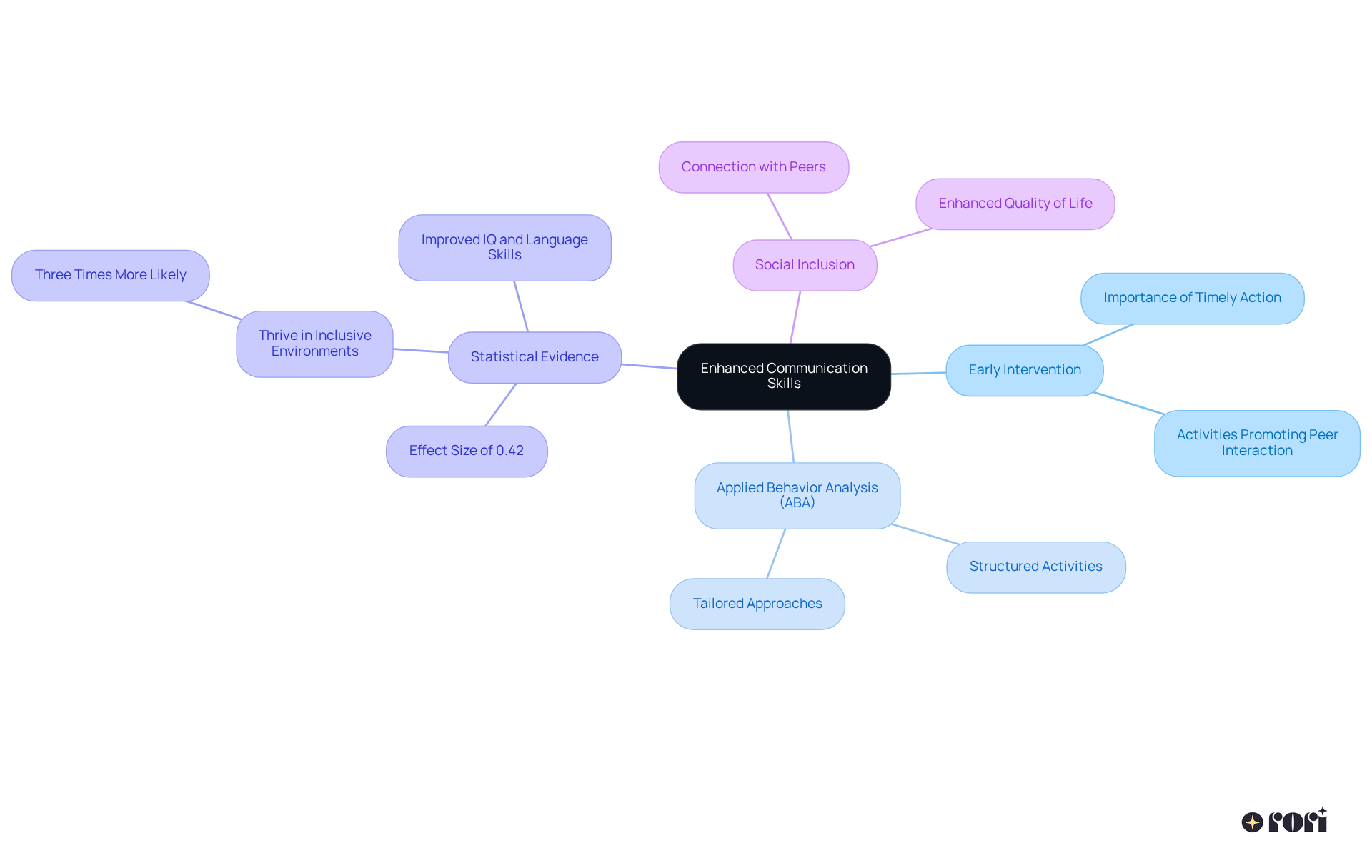
Timely support is so important for reducing challenging behaviors often seen in children with autism, like tantrums, aggression, and self-harm. With organized strategies and positive reinforcement, these young individuals can learn alternative behaviors and coping mechanisms.
Studies show that kids who receive early intervention autism benefits are much less likely to display these behaviors as they grow up, contributing to a calmer environment at home and school. For instance, children in early support programs experience an incredible 60% reduction in difficult behaviors within just six months of starting therapy! This improvement not only boosts their social interactions but also enhances family dynamics, demonstrating the early intervention autism benefits, with over 80% of families reporting a better quality of life and decreased stress after joining these programs.
Plus, timely assistance can save around $1.3 million per individual over their lifetime by reducing the need for long-term special education and intensive care. The evidence is clear: the early intervention autism benefits not only foster skill development but also open the door for children to thrive in all areas of life.
Let’s explore this together and see how we can make a difference!
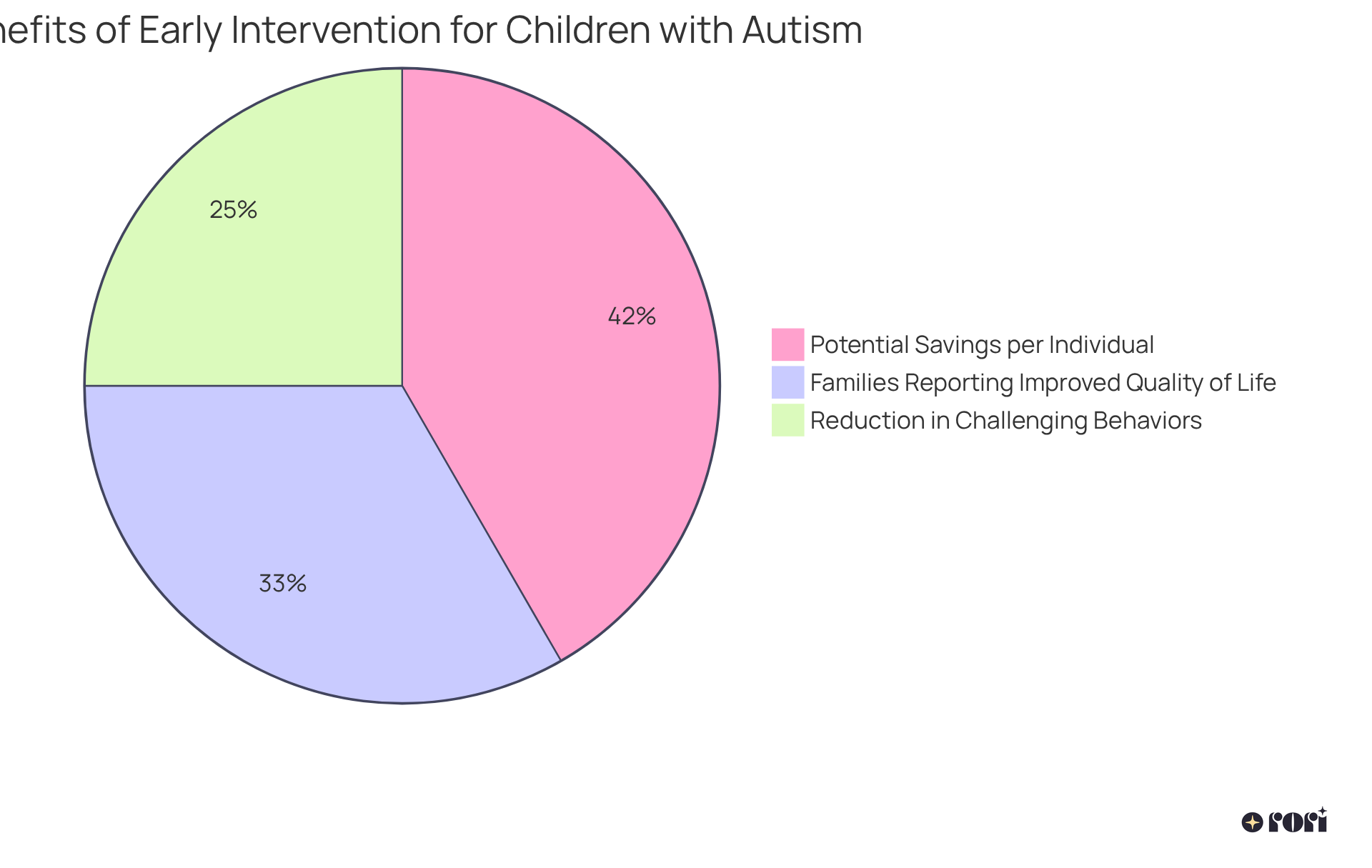
Prompt assistance is so important in helping young people gain independence in their everyday activities. It goes beyond just communication and behavior—it includes essential self-care skills too! With focused training, kids learn vital routines like dressing, feeding, and personal hygiene, all of which are key to fostering their autonomy.
Did you know that studies show kids who receive prompt assistance are much more likely to develop these skills? This leads to greater independence as they transition into adulthood. The earlier these skills are introduced, the greater the early intervention autism benefits for young individuals in preparing them for future educational and social environments. This really sets the stage for a more independent life!
Research indicates that children receiving early intervention autism benefits see a 30% increase in their self-care ability compared to those who don’t. Occupational therapists emphasize that the early intervention autism benefits of teaching self-care skills at a young age can significantly boost a person’s confidence and independence. And let’s not forget the transformative power of ABA therapy! It really enhances this progress, making prompt strategies not just effective, but essential for lasting success.
Let’s explore this together! We’re here to help you every step of the way!
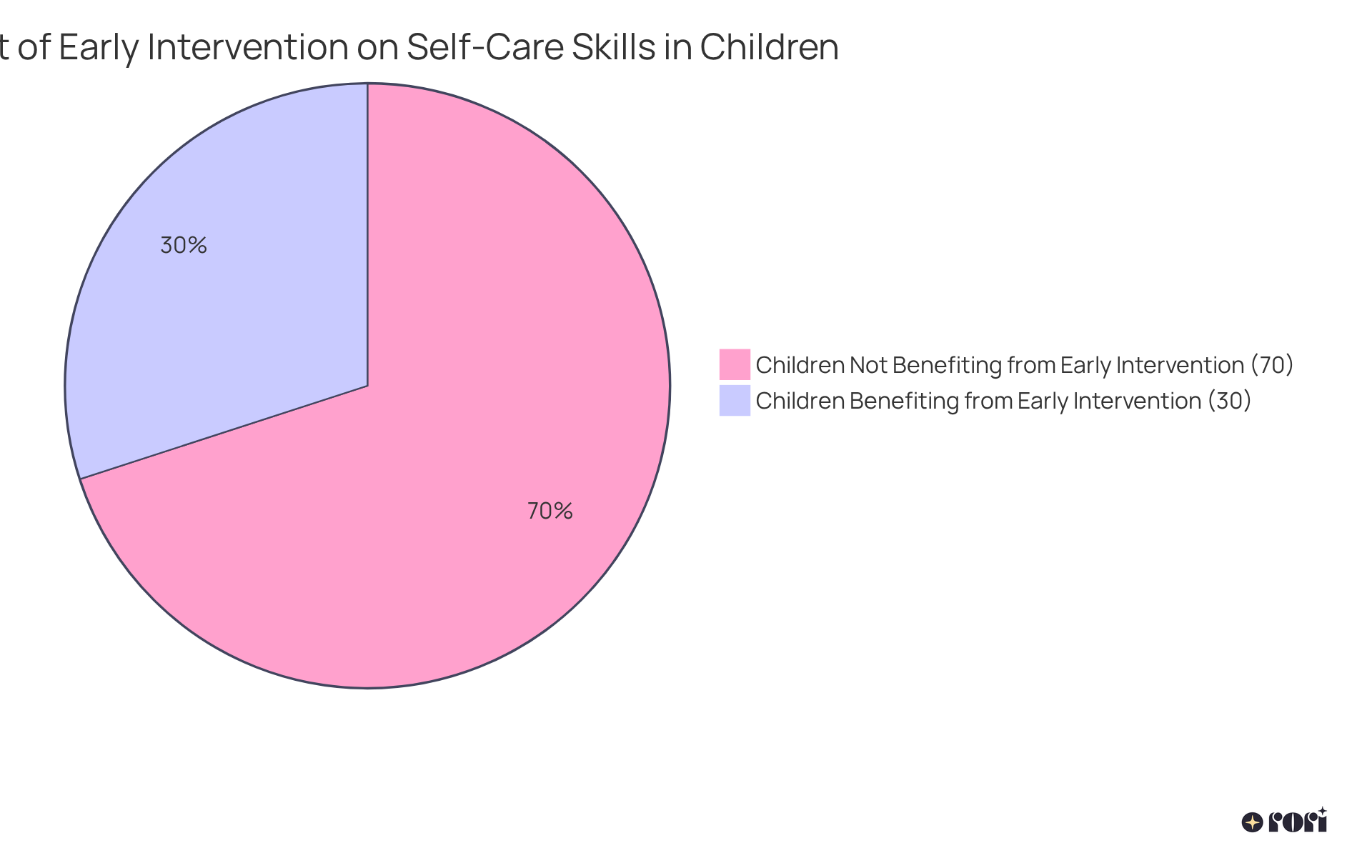
Social and play abilities are so important for kids with autism! The early intervention autism benefits can really make a difference in these skills. Programs that focus on play-based learning allow young individuals to practice social interactions in a safe space. Through organized play, kids learn to share, take turns, and communicate with their peers.
Isn’t it amazing? Studies show that children who benefit from early intervention autism benefits develop better social skills, which are key for making friends and joining in group activities. One study even found that kids involved in play-focused programs saw an impressive 18-point boost in their receptive language skills! This really highlights how effective early intervention autism benefits can be.
Plus, creating sensory-friendly environments can make a big difference too! These supportive settings help kids feel comfortable and relaxed while they engage in play-based learning. Let’s explore this together and see how we can support our little ones on their journey!
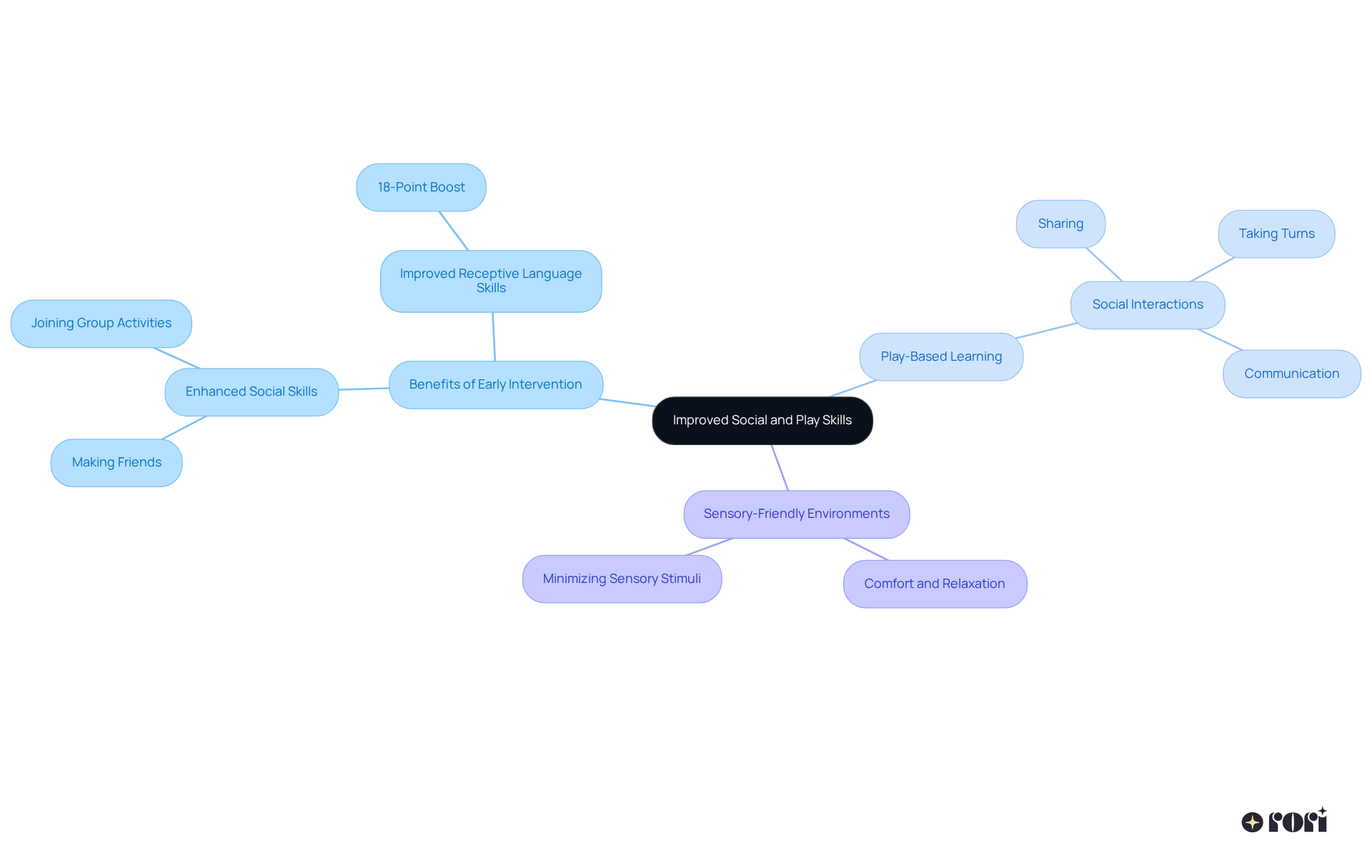
The early intervention autism benefits greatly aid our youngsters and empower parents by providing them with vital information and resources to nurture their children's growth. It's essential to involve parents in this support process; it ensures they understand the strategies being implemented and can effectively reinforce these skills at home.
Programs that include workshops, training sessions, and resources from specialists do wonders for parental confidence. They empower parents to advocate for their children's needs and implement effective strategies in daily life. For instance, studies suggest that the early intervention autism benefits are significant when parents are actively engaged in initial support programs, resulting in improvement among youngsters. In fact, children receiving early intervention autism benefits with parental involvement often see a remarkable 60% decrease in challenging behaviors within just six months!
Moreover, research highlights that up to 90% of youngsters receiving early intervention autism benefits develop functional communication abilities. This truly emphasizes the transformative influence of parental involvement. Just think about success stories like Ethan's, who participated in an ABA-based program for young ones. His experience shows how parental engagement can lead to substantial improvements in communication and behavior, reinforcing the idea that empowered parents are crucial to their children's development and success.
As Robert Collier wisely noted, 'Success is the sum of small efforts, repeated day in and day out.' This really underscores the importance of consistent parental involvement in nurturing our children's growth. So, let’s explore this together! We’re here to help you every step of the way!
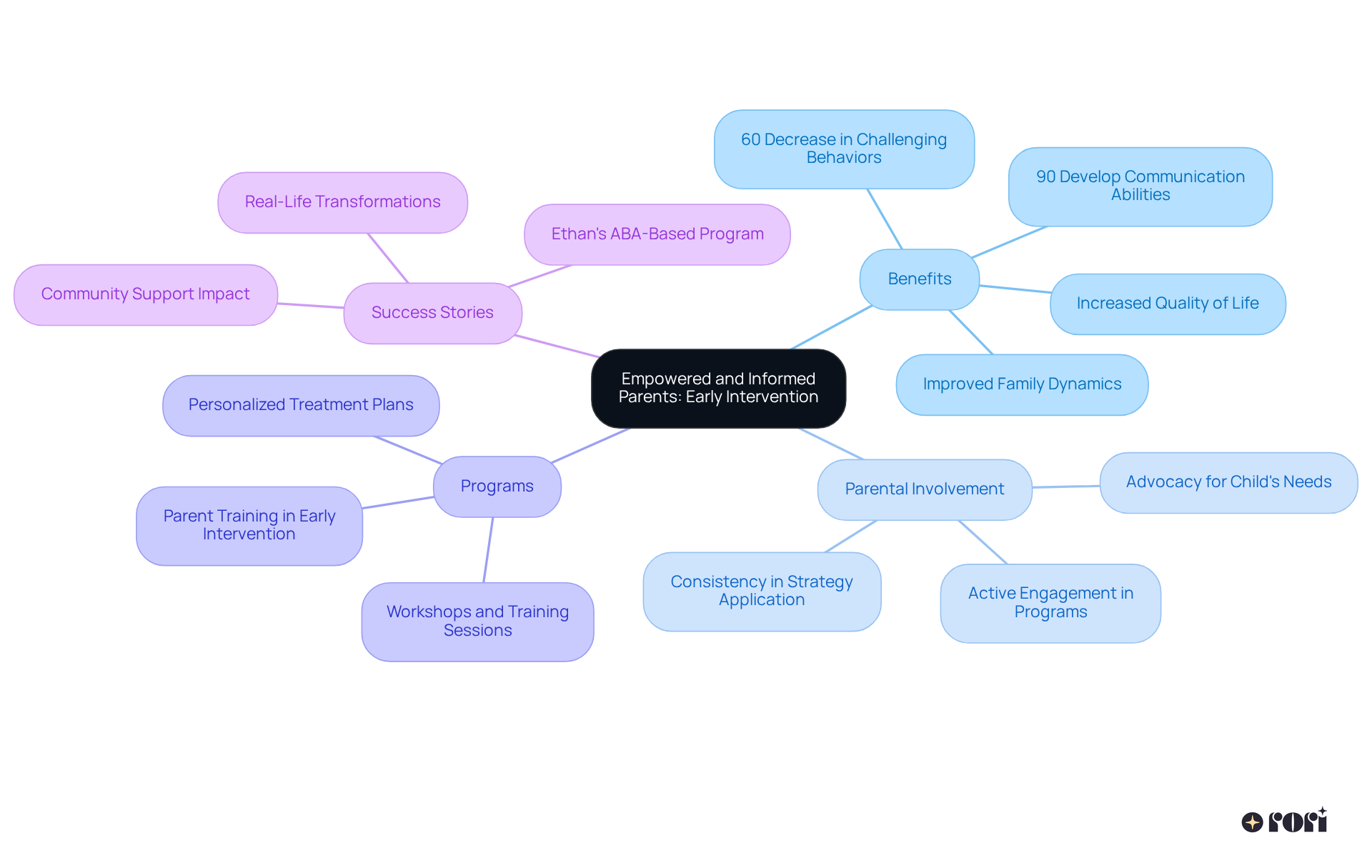
Studies consistently show that the early intervention autism benefits of starting support as soon as 18 months can lead to wonderful advancements in communication, social skills, and overall growth for individuals with autism. The brain's plasticity during these early years makes learning and adaptation easier, which is why initial support is so effective. For example, children who began individualized social interaction (Individual-ESI) at 18 months showed significantly greater gains in receptive and expressive language skills compared to those who started at 27 months. This really highlights how important it is to act within that timeframe, as even a slight delay can impact developmental outcomes.
Developmental psychologists emphasize the importance of early support, pointing out that the flexibility of infant brains allows for targeted strategies that can help realize the early intervention autism benefits by lessening the effects of autism. As Geraldine Dawson, Ph.D., chief science officer of Autism Speaks, beautifully stated, "By starting as soon as the toddler is diagnosed, we hope to maximize the positive effect of the support."
Parents are strongly encouraged to seek evaluations and support at the first signs of developmental delays. Taking prompt action not only nurtures those vital skills but also allows families to actively engage in their child’s growth journey. The long-lasting benefits of timely assistance are significant! Research shows that children who receive early intervention autism benefits are more likely to thrive in inclusive educational settings and enjoy a better quality of life. Plus, acting quickly can save an estimated $1.3 million per individual over their lifetime—talk about a financial advantage!
By recognizing the signs and seeking help early, families can truly transform their child’s developmental path for the better. Additionally, therapies like Applied Behavior Analysis (ABA), speech therapy, and occupational therapy play a crucial role in these early interventions, offering tailored support that meets each individual’s unique needs. Let’s explore this together, and remember, we’re here to help you every step of the way!
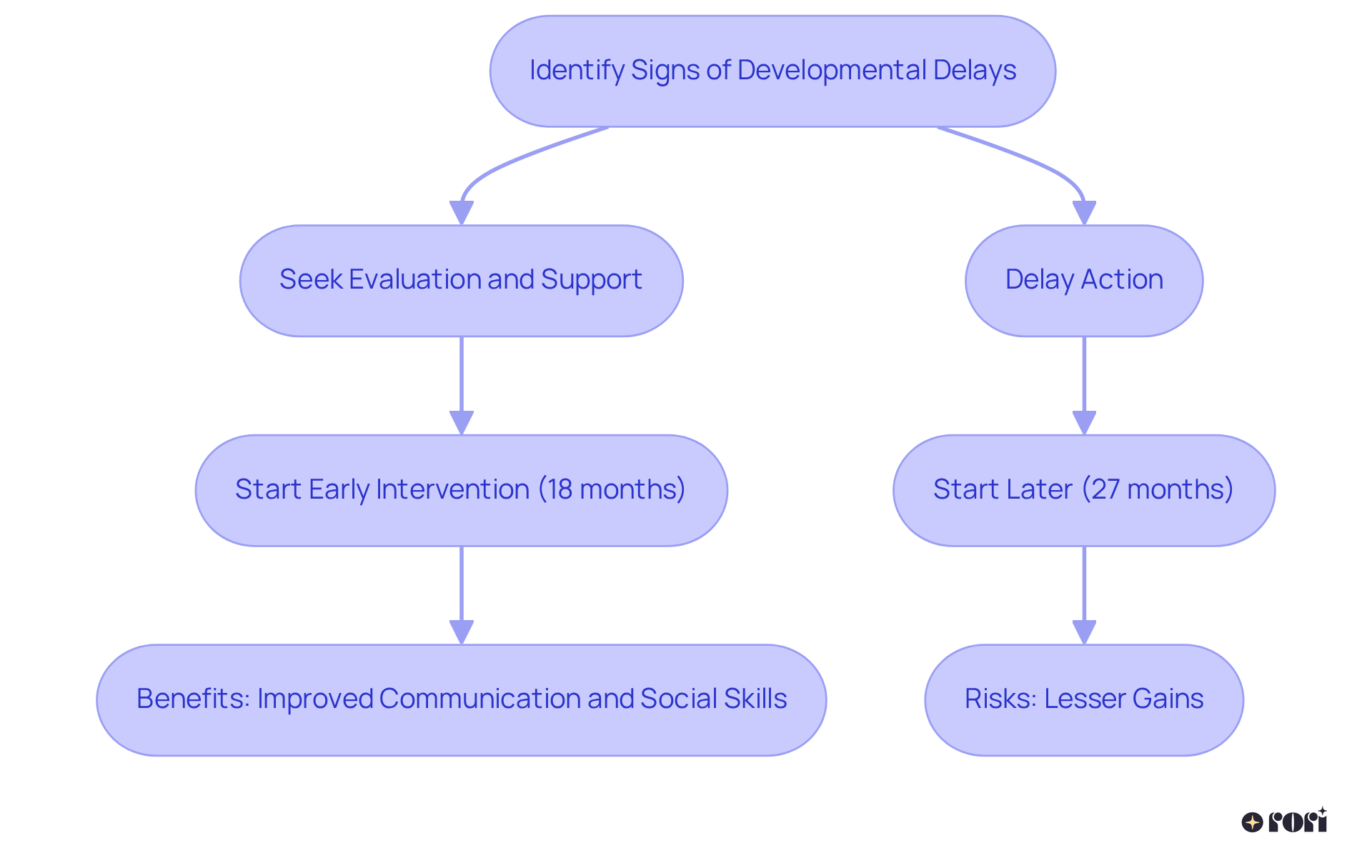
The Early Start Denver Model (ESDM) is a fantastic, evidence-supported intervention that offers early intervention autism benefits for little ones with autism aged 12 to 48 months. This innovative model blends Applied Behavioral Analysis (ABA) principles with developmental strategies, focusing on enhancing social communication and cognitive skills through playful engagement.
Research shows that children involved in ESDM experience amazing improvements, highlighting early intervention autism benefits such as:
What’s really exciting is that 29.2% of youths receiving ESDM experienced a diagnostic shift from autism to PDD-NOS, which highlights the early intervention autism benefits of the model beyond just skill enhancements.
By actively involving parents in the support process, ESDM not only strengthens families but also equips them with effective strategies to support their child's developmental journey. As a practical tip, parents are encouraged to engage in daily play activities that incorporate ESDM techniques, making learning and communication enjoyable and supportive.
Let’s explore this together and see how we can make a difference in our children’s lives!
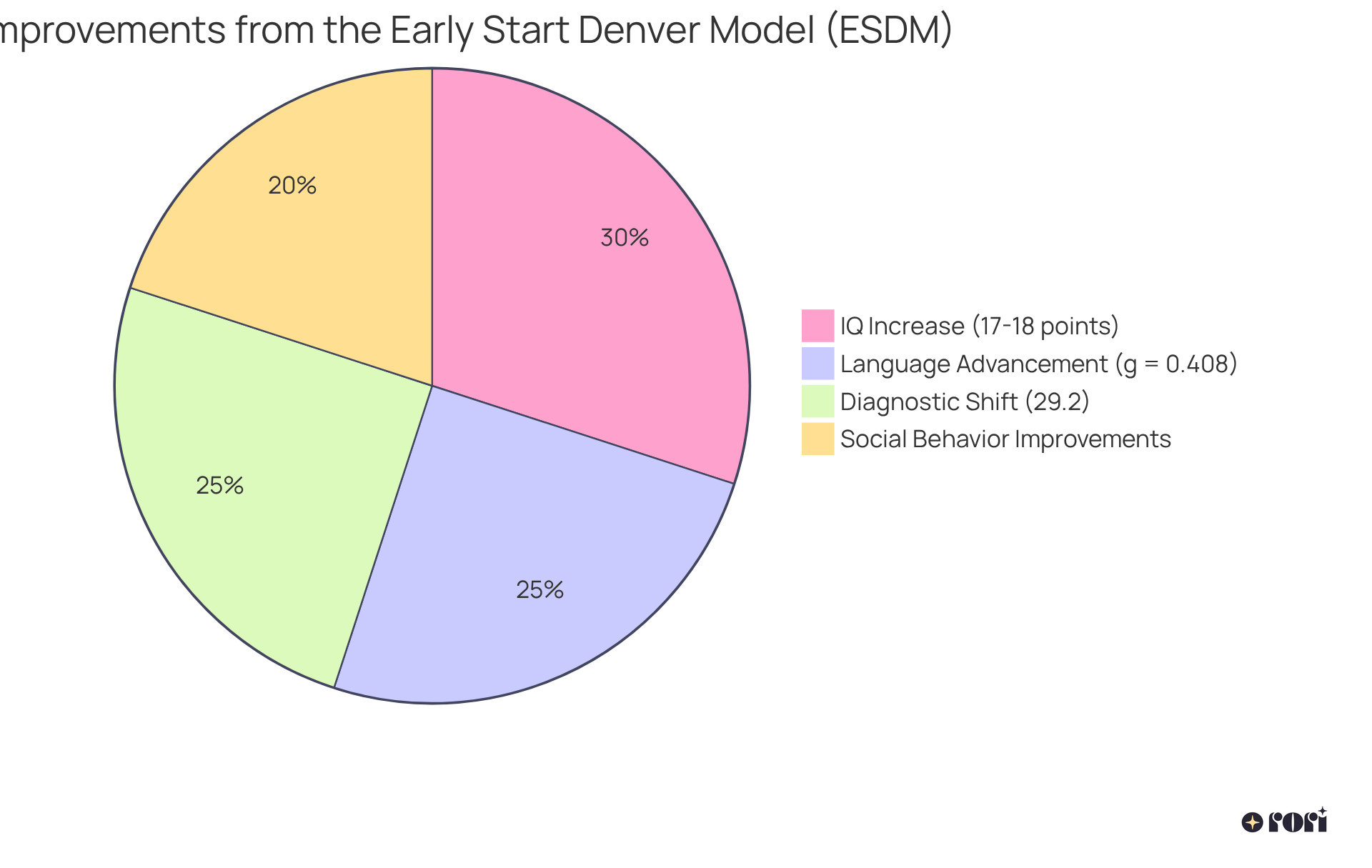
The advantages of prompt support stretch far beyond childhood! 🌟 Studies show that kids who benefit from early intervention autism benefits tend to thrive academically, socially, and professionally as they grow up. They often need fewer special education services and enjoy better outcomes when it comes to employment and living independently.
By addressing developmental challenges early on, families can take advantage of the early intervention autism benefits to help their children reach their full potential and lead fulfilling lives. Let’s explore this together! If you’re wondering how to support your child, remember, you’re not alone on this journey. We’re here to help you every step of the way!
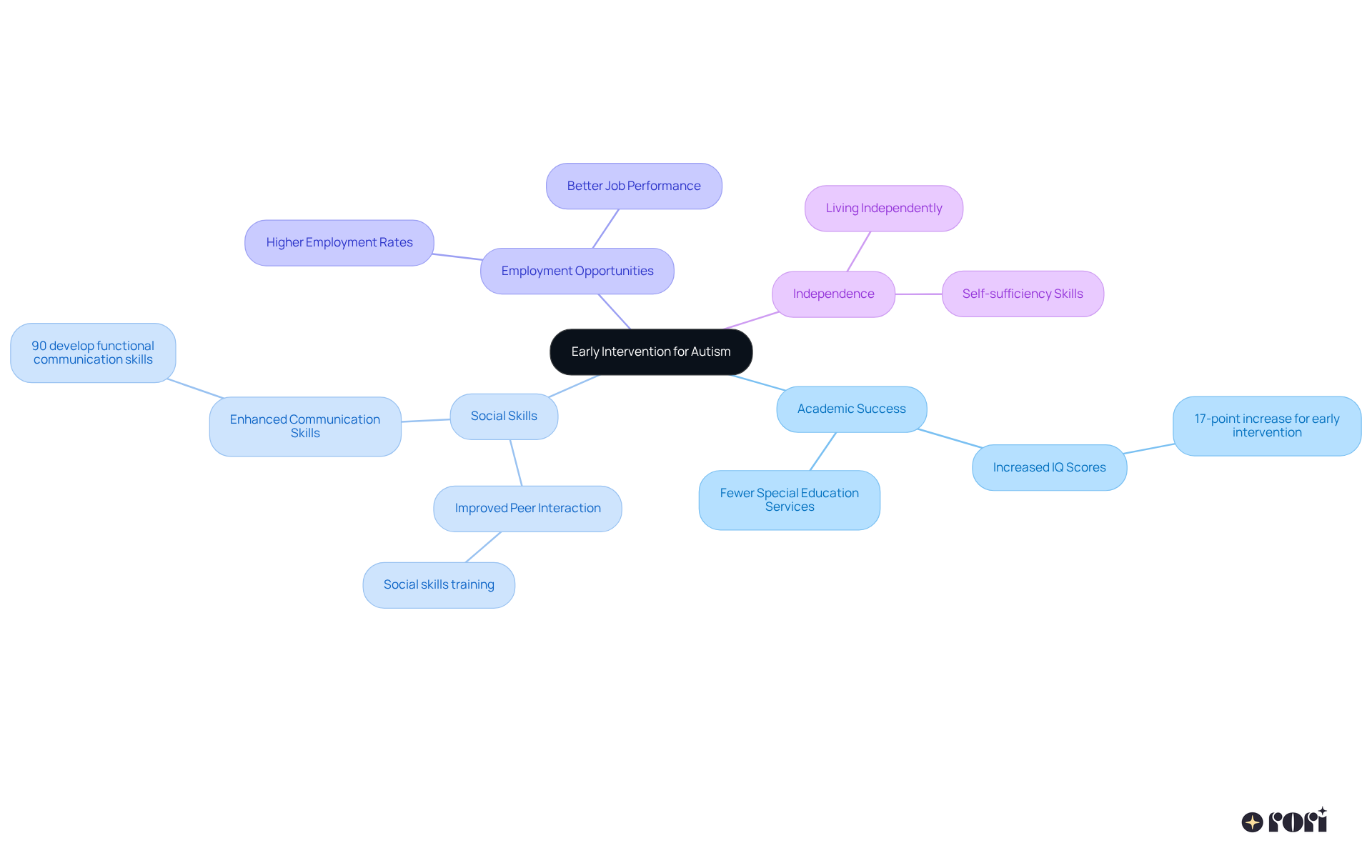
Successful prompt assistance is all about ongoing support and resources for both kids and their families. It's essential to have access to therapy, educational materials, and strong community support networks. Regular chats with experts help us adjust strategies as kids grow and their needs change.
At Rori Behavioral Innovations, we offer a wide range of resources, including workshops, informative articles, and support groups, all designed to empower families facing the challenges of autism. Did you know that, according to the Centers for Disease Control and Prevention, autism affects about 1 in 36 kids in the United States? This highlights the urgent need for effective early intervention autism benefits.
Community support networks have demonstrated their ability to significantly boost the effectiveness of strategies that highlight early intervention autism benefits. Families involved in these networks often share that they see early intervention autism benefits, resulting in better outcomes for their children. As Laura Conrad, a Senior Consultant at the Technical Assistance Collaborative, Inc., wisely notes, 'One of the most important factors in improving the outcome for individuals with ASD is the early intervention autism benefits that come from early screening and diagnosis.'
By tapping into these resources, families can navigate the complexities of autism care more effectively, ensuring their child's growth and development are at the forefront. Let’s explore this journey together, and remember, we’re here to help you every step of the way!
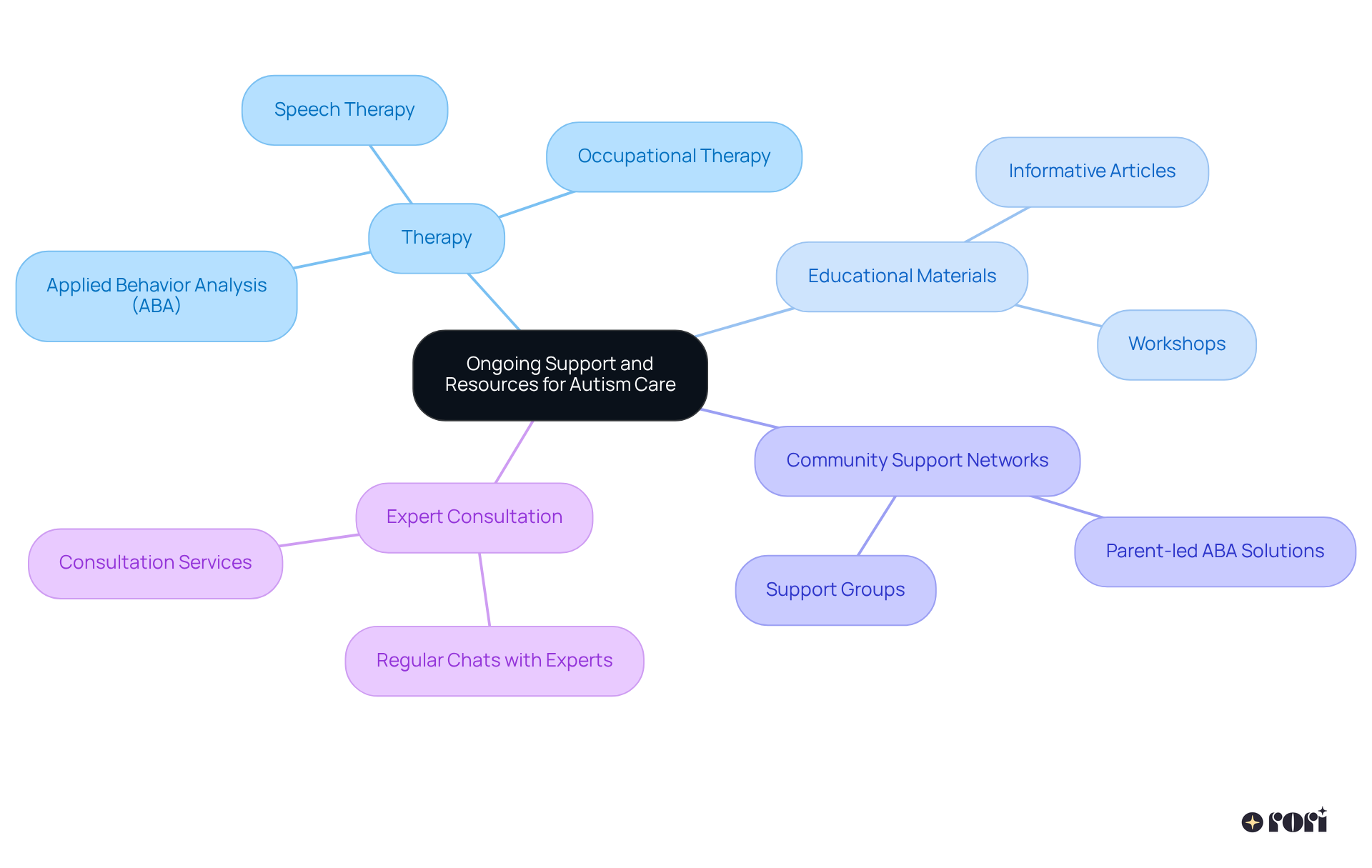
The transformative power of early intervention for children with autism truly shines through. By embracing personalized strategies and support from an early age, families can significantly boost their child's communication skills, social interactions, and independence. It's clear that timely intervention leads to better outcomes, paving the way for a more fulfilling life for young individuals with autism.
In this article, we've highlighted some key benefits, such as:
Research shows that children who receive early intervention are more likely to thrive in inclusive settings, develop essential life skills, and experience lasting positive changes in their behavior. Plus, empowering parents with education and resources is vital in maximizing these benefits, ensuring families are well-equipped to support their children's growth.
Ultimately, the significance of early intervention goes beyond immediate improvements; it lays the groundwork for a brighter future. By recognizing developmental delays and seeking support promptly, families can truly change their child's trajectory for the better. Acting early and utilizing available resources is essential, as this proactive approach not only fosters skill development but also enhances the quality of life for both children and their families. Embracing early intervention is a powerful step toward unlocking the full potential of children with autism. Let’s explore this together!
What is Rori Care's approach to ABA therapy for autism?
Rori Care uses Applied Behavior Analysis (ABA) therapy as a key part of their early intervention strategies, focusing on personalized treatment plans that enhance communication, social skills, and independence for each child based on their unique needs.
How does Rori Care personalize treatment plans for children with autism?
Each child's unique needs are assessed through thorough evaluations, leading to a tailored treatment plan that includes strategies to help them use their skills in various environments, promoting self-sufficiency.
What role does technology play in Rori Care's therapy methods?
Rori Care integrates AI-driven technologies to ensure their methods are effective and adaptable to each child's evolving needs, providing the best possible support from the beginning.
What are the benefits of early intervention for children with autism?
Early intervention can lead to significant improvements in cognitive, communication, and social skills, fostering greater independence and better long-term outcomes for children with autism.
Why is educating caregivers important in ABA therapy?
Educating caregivers enhances the effectiveness of ABA therapy, empowering families to support their child's growth at home, which is crucial for the child's development.
How does early intervention improve communication skills in children with autism?
Programs using ABA techniques focus on structured activities and social interactions, leading to significant improvements in communication abilities, as studies show meaningful enhancements in spoken language outcomes.
What impact does early intervention have on children's educational success?
Children receiving early intervention benefits before age four are three times more likely to thrive in inclusive educational environments, highlighting the importance of prompt action.
How does early intervention reduce challenging behaviors in children with autism?
Timely support with organized strategies and positive reinforcement helps children learn alternative behaviors and coping mechanisms, resulting in a significant reduction in challenging behaviors.
What are the reported outcomes for families involved in early intervention programs?
Over 80% of families report a better quality of life and decreased stress after joining early intervention programs, which also contribute to a calmer environment at home and school.
What financial benefits can early intervention provide?
Timely assistance can save around $1.3 million per individual over their lifetime by reducing the need for long-term special education and intensive care.